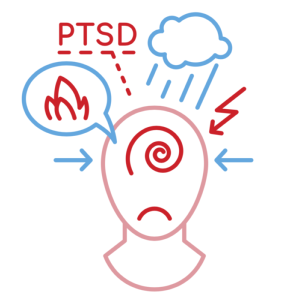
In our recent tip sheet from AccessATE and HERL, we mention that veterans can suffer from post-traumatic stress disorder. This can have a major impact on their life and their jobs, but like all conditions we’ve discussed, it does not mean that they cannot perform their jobs to the same standard as their coworkers – it’s a simple matter of understanding and accommodation. Here, we will further discuss post-traumatic stress disorder, and how an employer might make adjustments for it in the workplace.
Tip Sheet: Working with Veterans: Support
Post-traumatic stress disorder, or PTSD, is defined as a mental health disorder that people may develop after experiencing or witnessing a shocking, scary, or life-threatening event, such as combat, a natural disaster, an accident, or assault. Such an event is often referred to as a “traumatic event” or a “trauma”. Anyone can develop PTSD, at any time. PTSD doesn’t always occur immediately after the traumatic event. PTSD can make it difficult to navigate daily life and/or to perform certain activities, or to be exposed to certain stimuli. Symptoms include, but are not exclusive to, unbidden, recurring memories of the traumatic event; anxiety and/or depression; hyperarousal (feeling “amped up” or “on edge”); negative changes to personal feelings and beliefs; and avoiding situations that might trigger memories of the traumatic event. PTSD is more common among veterans than other groups; roughly 13% of veterans are diagnosed with PTSD, a strikingly high rate compared to the 6% of the general adult population.
As mentioned above, PTSD can affect a person’s job, as getting to or being at work can itself be triggering, depending on the nature of the work. As a result, the employee may call in sick often, or simply not show up. In the workplace, PTSD can cause the employee to have trouble concentrating or remembering things; have trouble with their coworkers; take longer to complete tasks; be very tired, anxious, or fearful; and have difficulty coping with stress. To support an employee struggling with PTSD, it’s important to maintain a dialogue with them, and to be open and empathetic. Talk to the employee about what they’re struggling with, and do your best to meet their needs. Sufferers of PTSD have different triggers, but common triggers include loud noises, crowded areas, being approached or touched unexpectedly, and disputes or conflicts. To address these, provide a work area that is as quiet and distraction-free as possible, where they can see others approaching, and encourage calm discussion when issues arise. If the employee has trouble concentrating or remembering, provide tasks in a structured list broken into manageable, incremental steps, and provide written instructions when needed. If possible, offer a flexible schedule or the option to work from home. If the employee affected by PTSD is OK with it, raise awareness among and provide training for the rest of your team – this is likely to inspire more patience and sensitivity.
Additional Resources
- Employees with PTSD may need to use more PTO, vacation, and/or sick leave than the average employee. If your business offers it, provide the employee with information about the Family and Medical Leave Act, or FMLA, which covers health conditions.
- For more information on PTSD triggers, we recommend this brief article from the Department of Veterans Affairs and Common Triggers Among Veterans with PTSD.
- If you are an employee with PTSD, or you have an employee with PTSD and would like to help them prepare to discuss their needs, check out How Do I Talk to an Employer About My PTSD?
- JAN’s article on PTSD provides accommodation ideas based on the limitations the employee might be experiencing.




 See More Feature Articles
See More Feature Articles